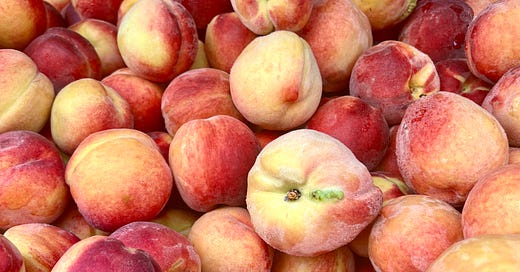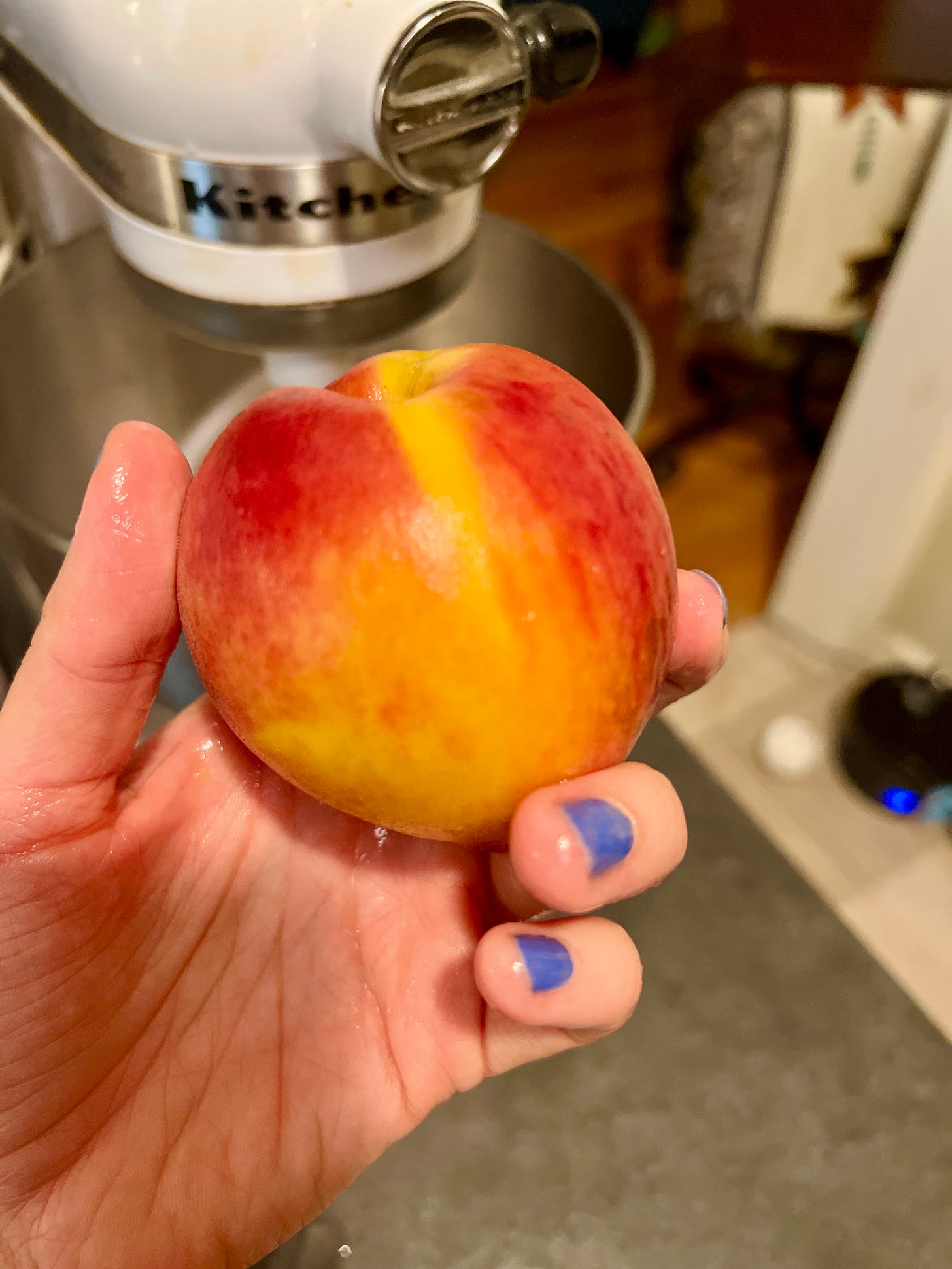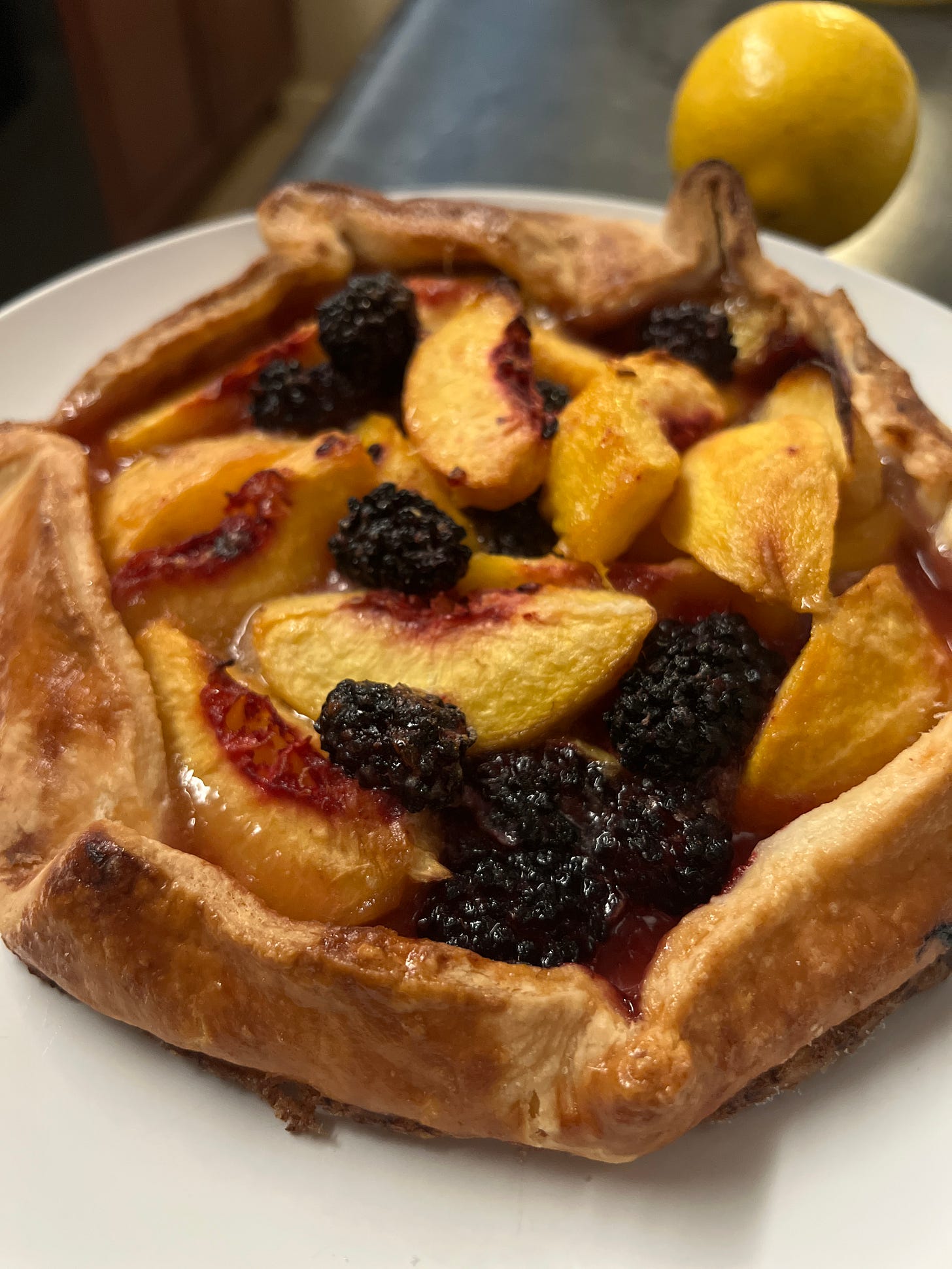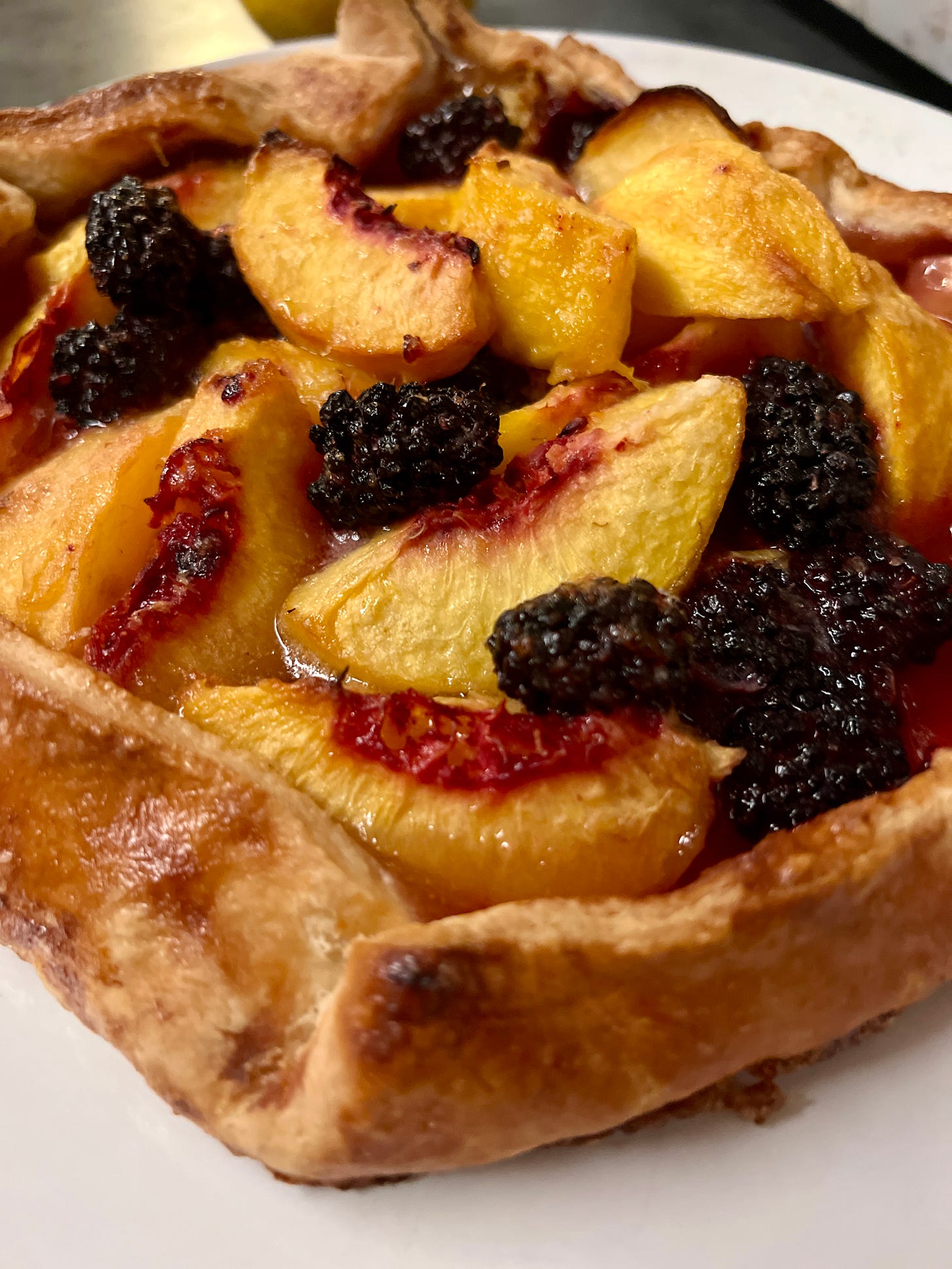I’d been thinking about heirloom tomatoes for days, so when I got off the train at 81st Street and came upon a farmers market chock full of the dark, juicy, oddly- proportioned beauties, I was over the moon. These are the types of situations I’ve only found in New York. Yes, intense planning can be required to make the train at the right time to get to the place with enough time that makes you seem responsible but not not too eager, but every now and then, you say something out loud and this city will bring it to you. I combed through and picked a respectable pair of heirlooms and stood in line to pay, thinking about the simple joy of a ripe tomato with a sprinkling of salt and pepper and the endless photos I’d been seeing on Instagram of mouthwatering BLTs. Waiting in line, I looked at the other produce for sale: plums, strawberries, apples. Sitting with the rest of the stone fruits were a prepossessing display of peaches. I couldn’t look away.
Stone fruits aren’t what I typically go for when shopping for produce, even in their peak summer ripeness. This will come as a surprise to no one who knows me well, but I’m a creature of habit when it comes to food; I buy two honeycrisp apples and four almost-ripe bananas weekly and I’ve been doing that for a number of years at this point. Sometimes Evan would go for grapes or strawberries which were always a fun treat for the both of us, but nectarines, plums, or peaches weren’t fruits we stocked at home. This had nothing to do with their taste but more so perhaps that we lived in California for a long time and didn’t feel the pressure of the looming end of a particular fruit’s season. As the line at the farmers market began to move, I decided I needed to get a closer look at the peaches for reasons I didn’t quite understand. I’d come for tomatoes but the beauty of the soft flesh and pleasing color practically begged me to pick up a few. Transparently, I didn’t know what I was looking for in a ripe peach, but I figured a gentle give, not dissimilar to a ripe avocado was probably a good starting point (best peach-picking practices welcome to this novice plz).
There’s a certain amount of bodily autonomy of which grief robs its victim; the immune system, appetite, muscles, sleep patterns, and general ability to function, no matter how well you take care of yourself, can at times seem impossible. For the better part of a year, I can only describe the effects of my grief as through I’ve been wading through tepid water. I’ve felt invisible to a lot of people, but most importantly to myself. My body wasn’t my own; it was simply the vehicle through which I moved through the world. I’d felt a hint of being alive again on my recent vacation to Paris, and picking through peaches at the farmers market, the feeling overwhelmed me. For the first time in a long time, my senses were activated and all it took was something as simple as a beautiful ripe produce. There’s something to be said (and there are a lot of people who write and say a lot about it) about the sensuality of food, and in particular the sensuality of a fruit whose season, whose beauty, whose very existence in the city in which I live, is fleeting.
Of course, there’s a longstanding connection in art and culture between peaches and sexuality, but, fear not dear reader, I was not having a sexual reawakening there at the farmers market surrounded by the middle-aged women of the Upper West Side. The experience was more akin to feeling a gentle breeze in the oppressive humidity of summer, or the first bubbly sip of a soda. It was pleasure when my definition of the word had been completely lost. Of course, there have been other moments of pleasure in the past year of my life, but the simple tickle of peach fuzz on my fingers, the smell emanating from a collection of ripe fruit, and the way my mouth watered when the scent hit my nose, reminded me that I was and am a living breathing human with a body that deserves both simple and very big joys. Pleasure and grief can exist simultaneously, I’ve heard over and over, but knowing something is not the same as feeling it. Yes, there is grief and there is ugliness and there always will be, but every now and then there is also a farmers market with peaches that make you feel so disgustingly alive.
It feels strange and hyperbolic to say that stone fruit season in New York, and perhaps more likely summer in New York, has changed, at least temporarily, the way I think about my body. This summer has been unbearably hot and humid and as a result, I’ve begun to dress accordingly to deal with it. As such, I’ve been forced to look at my body more than I have in recent memory, which has never been a comfortable feeling. In those moments of discomfort, I try to remember something my former (and favorite) therapist told me about grief, which is that it’s regularly facing both discomfort and the fact that everything is temporary. Summer will come to a close, and with its end will come cold and layers of clothes and no more peaches at the farmers markets, so I’m forcing myself to revel in the temporary and sometimes uncomfortable beauty of summer. For as much as a New Yorker will tell you about the horrors of summer in New York, there truly is beauty all around. The grit and tenacious nature of everyone here is objectively beautiful. The people and the way they express themselves through the way they move about the city is beautiful. These, of course, are all my own definition of beauty, a dizzying term which means something different to each person you will ask.
To the ancient Greeks, beauty was symmetry. To John Keats, beauty was truth. To Pablo Picasso, beauty was genius. To David Bowie beauty was strange. Why then, is there a societal beauty standard that seems to plague nearly everyone I know?And how do we learn to define it for ourselves while living in a world that tries to tell you exactly what your definition should be? I’m still trying to decide what beauty is to me and I imagine I will be for a long time. Historically, when it’s come to the bodily notion of beauty, my own beauty ideal was a thin, waifish, damn near helpless feminine figure that I struggled to embody on a daily basis. I saw in others what I thought I might never be, so I never gave myself the value of beauty. Even now, I see people everyday and can’t help but compare myself to them—they have an allure, an attraction, a mystery that I can’t seem to find within myself. It’s odd to me then, that when looking at a collection of peaches, plump and round, I found them beautiful beyond compare. It makes me think that my definition of beauty must have something to do with its fleeting nature.
Peaches are thought to have originated in ancient China, where they were believed to have the power to bestow immortality on those who ate them, granting them eternal youth, which has long been a currency with great value. In Call Me By Your Name, the peach foreshadows the end of Elio and Oliver’s summer romance. In Parasite, the peach is used as a tool to break down a long-standing class structure. The temporariness of beauty contains a sense of danger when misunderstood for an established state of being. We may then find beauty alluring because of that hint of danger. We don’t necessarily know what to do with it or how to react to it. Do we put it on a pedestal or criticize the fact that it’s historically been put on a pedestal? Do we call it out or intentionally do the opposite so as not to give it too much power? It is, after all, a currency that can be used for nefarious reasons when harnessed correctly. At the end of the day, however, it’s fleeting; a peach is only really delicious when it’s ripe.
“Peaches are so pretty to look at, but you can attack someone with them.”
-Bong Joon-Ho
In an effort to make the most of this temporary season, this fleeting beauty I’ve allowed in, I decided to make a peach dessert. I haven’t been baking a lot, but I know the feeling of using my hands to create something beautiful always makes me feel accomplished. I came across Katie Button’s recipe for Summer Peach and Blackberry Galette. In the blurb before the recipe, she says “No matter how you fold or crimp them, they always look beautiful; in fact the more rustic they look, the prettier they seem to be.” It struck me as profound that she said essentially no matter how they look, a galette will always look beautiful, which pointed to the fact that everyone’s definition of beauty is different. Of course the photo of her version is objectively beautiful—the peaches a burnt orange complimented by dark juicy blackberries. As I made my own, I thought a lot about my own definition of beauty and how it doesn’t necessarily have to be seen. Beauty was the juice of peach running down my fingers as I sliced into it. Beauty was the smell of dough in the oven. Beauty was the sound of fruit mixed with cornstarch and sugar bubbling as I took it out of the oven. All of these moment just for the small window of time I was baking. Beauty doesn’t have to announce itself and be followed by fanfare from the masses. After all, summer ends and the peaches will disappear from the farmers market. What then, will be left?








